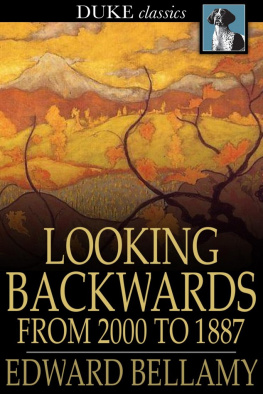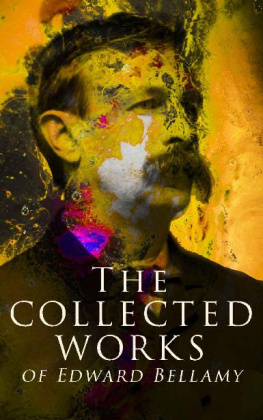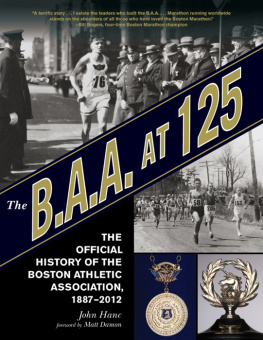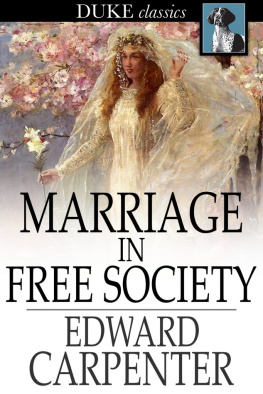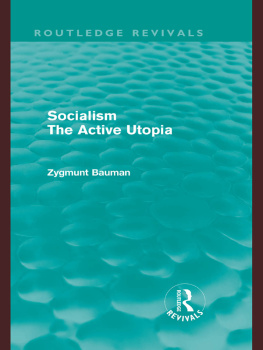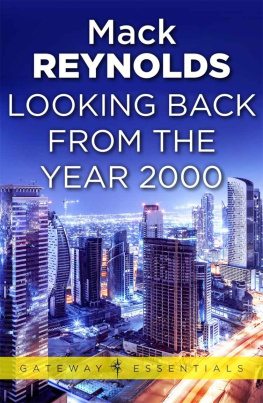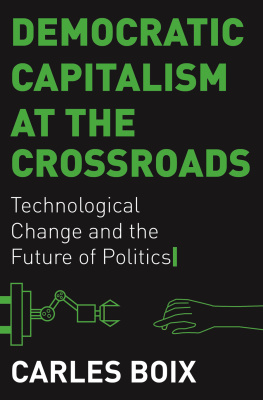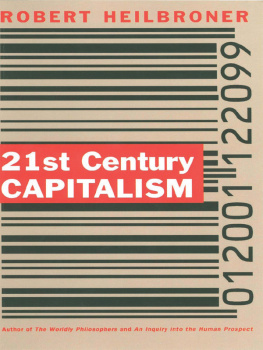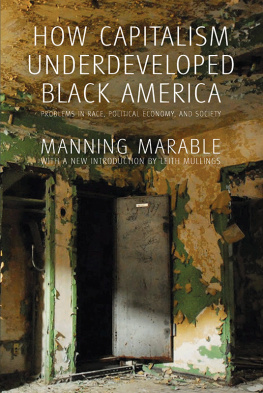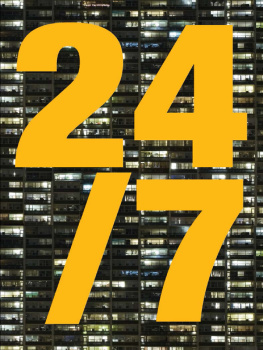LOOKING BACKWARDS
FROM 2000 TO 1887
* * *
EDWARD BELLAMY
*
Looking Backwards
From 2000 to 1887
First published in 1888
ISBN 978-1-62012-312-6
Duke Classics
2012 Duke Classics and its licensors. All rights reserved.
While every effort has been used to ensure the accuracy and reliability of the information contained in this edition, Duke Classics does not assume liability or responsibility for any errors or omissions in this book. Duke Classics does not accept responsibility for loss suffered as a result of reliance upon the accuracy or currency of information contained in this book.
Contents
*
Author's Preface
*
Historical Section Shawmut College, Boston,
December 26, 2000
Living as we do in the closing year of the twentieth century, enjoyingthe blessings of a social order at once so simple and logical that itseems but the triumph of common sense, it is no doubt difficult forthose whose studies have not been largely historical to realize thatthe present organization of society is, in its completeness, less thana century old. No historical fact is, however, better established thanthat till nearly the end of the nineteenth century it was the generalbelief that the ancient industrial system, with all its shocking socialconsequences, was destined to last, with possibly a little patching, tothe end of time. How strange and wellnigh incredible does it seem thatso prodigious a moral and material transformation as has taken placesince then could have been accomplished in so brief an interval! Thereadiness with which men accustom themselves, as matters of course, toimprovements in their condition, which, when anticipated, seemed toleave nothing more to be desired, could not be more strikinglyillustrated. What reflection could be better calculated to moderate theenthusiasm of reformers who count for their reward on the livelygratitude of future ages!
The object of this volume is to assist persons who, while desiring togain a more definite idea of the social contrasts between thenineteenth and twentieth centuries, are daunted by the formal aspect ofthe histories which treat the subject. Warned by a teacher's experiencethat learning is accounted a weariness to the flesh, the author hassought to alleviate the instructive quality of the book by casting itin the form of a romantic narrative, which he would be glad to fancynot wholly devoid of interest on its own account.
The reader, to whom modern social institutions and their underlyingprinciples are matters of course, may at times find Dr. Leete'sexplanations of them rather tritebut it must be remembered that toDr. Leete's guest they were not matters of course, and that this bookis written for the express purpose of inducing the reader to forget forthe nonce that they are so to him. One word more. The almost universaltheme of the writers and orators who have celebrated this bimillennialepoch has been the future rather than the past, not the advance thathas been made, but the progress that shall be made, ever onward andupward, till the race shall achieve its ineffable destiny. This iswell, wholly well, but it seems to me that nowhere can we find moresolid ground for daring anticipations of human development during thenext one thousand years, than by "Looking Backward" upon the progressof the last one hundred.
That this volume may be so fortunate as to find readers whose interestin the subject shall incline them to overlook the deficiencies of thetreatment is the hope in which the author steps aside and leaves Mr.Julian West to speak for himself.
Chapter 1
*
I first saw the light in the city of Boston in the year 1857. "What!"you say, "eighteen fifty-seven? That is an odd slip. He means nineteenfifty-seven, of course." I beg pardon, but there is no mistake. It wasabout four in the afternoon of December the 26th, one day afterChristmas, in the year 1857, not 1957, that I first breathed the eastwind of Boston, which, I assure the reader, was at that remote periodmarked by the same penetrating quality characterizing it in the presentyear of grace, 2000.
These statements seem so absurd on their face, especially when I addthat I am a young man apparently of about thirty years of age, that noperson can be blamed for refusing to read another word of what promisesto be a mere imposition upon his credulity. Nevertheless I earnestlyassure the reader that no imposition is intended, and will undertake,if he shall follow me a few pages, to entirely convince him of this. IfI may, then, provisionally assume, with the pledge of justifying theassumption, that I know better than the reader when I was born, I willgo on with my narrative. As every schoolboy knows, in the latter partof the nineteenth century the civilization of to-day, or anything likeit, did not exist, although the elements which were to develop it werealready in ferment. Nothing had, however, occurred to modify theimmemorial division of society into the four classes, or nations, asthey may be more fitly called, since the differences between them werefar greater than those between any nations nowadays, of the rich andthe poor, the educated and the ignorant. I myself was rich and alsoeducated, and possessed, therefore, all the elements of happinessenjoyed by the most fortunate in that age. Living in luxury, andoccupied only with the pursuit of the pleasures and refinements oflife, I derived the means of my support from the labor of others,rendering no sort of service in return. My parents and grand-parentshad lived in the same way, and I expected that my descendants, if I hadany, would enjoy a like easy existence.
But how could I live without service to the world? you ask. Why shouldthe world have supported in utter idleness one who was able to renderservice? The answer is that my great-grandfather had accumulated a sumof money on which his descendants had ever since lived. The sum, youwill naturally infer, must have been very large not to have beenexhausted in supporting three generations in idleness. This, however,was not the fact. The sum had been originally by no means large. Itwas, in fact, much larger now that three generations had been supportedupon it in idleness, than it was at first. This mystery of use withoutconsumption, of warmth without combustion, seems like magic, but wasmerely an ingenious application of the art now happily lost but carriedto great perfection by your ancestors, of shifting the burden of one'ssupport on the shoulders of others. The man who had accomplished this,and it was the end all sought, was said to live on the income of hisinvestments. To explain at this point how the ancient methods ofindustry made this possible would delay us too much. I shall only stopnow to say that interest on investments was a species of tax inperpetuity upon the product of those engaged in industry which a personpossessing or inheriting money was able to levy. It must not besupposed that an arrangement which seems so unnatural and preposterousaccording to modern notions was never criticized by your ancestors. Ithad been the effort of lawgivers and prophets from the earliest ages toabolish interest, or at least to limit it to the smallest possiblerate. All these efforts had, however, failed, as they necessarily mustso long as the ancient social organizations prevailed. At the time ofwhich I write, the latter part of the nineteenth century, governmentshad generally given up trying to regulate the subject at all.
By way of attempting to give the reader some general impression of theway people lived together in those days, and especially of therelations of the rich and poor to one another, perhaps I cannot dobetter than to compare society as it then was to a prodigious coachwhich the masses of humanity were harnessed to and dragged toilsomelyalong a very hilly and sandy road. The driver was hunger, and permittedno lagging, though the pace was necessarily very slow. Despite thedifficulty of drawing the coach at all along so hard a road, the topwas covered with passengers who never got down, even at the steepestascents. These seats on top were very breezy and comfortable. Well upout of the dust, their occupants could enjoy the scenery at theirleisure, or critically discuss the merits of the straining team.Naturally such places were in great demand and the competition for themwas keen, every one seeking as the first end in life to secure a seaton the coach for himself and to leave it to his child after him. By therule of the coach a man could leave his seat to whom he wished, but onthe other hand there were many accidents by which it might at any timebe wholly lost. For all that they were so easy, the seats were veryinsecure, and at every sudden jolt of the coach persons were slippingout of them and falling to the ground, where they were instantlycompelled to take hold of the rope and help to drag the coach on whichthey had before ridden so pleasantly. It was naturally regarded as aterrible misfortune to lose one's seat, and the apprehension that thismight happen to them or their friends was a constant cloud upon thehappiness of those who rode.

